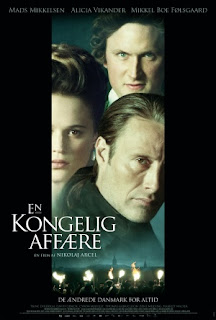A Royal Affair
A Royal Affair, from Denmark, directed by Nikolaj Arcel, is the second of last year's Best Foreign Language Film nominees I've seen. It's a stately costume drama, depicting one of the most famous events in Danish royal history, at least after Hamlet.
It is the late 1700s. The Enlightenment thinkers, such as Voltaire, Locke, and Rousseau, have stirred things up in many places, but not Denmark, which remains a place of medieval practices. The king is Christian VII, who is mentally ill. In an arrangement, he is betrothed to Caroline of England (she was the sister of the man who would one day be George III). She soon discovers that Christian has a screw loose, and lives in misery.
The King is persuaded to hire a personal physician, and through some intrigue by banished dukes, a small-town German doctor, Johann Struensee, (Mads Mikkelsen) applies for the job. The mercurial King hires him because he knows lines from Shakespeare. What the court doesn't know is that he is firmly of the Enlightenment, and starts influencing Christian to make reforms.
This goes pretty well, except that Mikkelsen and the Queen (played by the dewy beauty Alicia Vikander) bond over their shared beliefs and are soon making the beast with two backs. Even though it becomes an open secret, Christian refuses to believe it, even after Vikander bears Mikkelsen a daughter (she has to have a reluctant roll in the hay with Christian in order to make the birth seem legitimate).
Eventually the enemies of the reforms, including the King's stepmother, who wants her own son on the throne, and members of the Council, led by a priest, root out the truth, and Denmark slips back to its old ways. But there is an epilogue that shows how important this was to Danish history.
It is the late 1700s. The Enlightenment thinkers, such as Voltaire, Locke, and Rousseau, have stirred things up in many places, but not Denmark, which remains a place of medieval practices. The king is Christian VII, who is mentally ill. In an arrangement, he is betrothed to Caroline of England (she was the sister of the man who would one day be George III). She soon discovers that Christian has a screw loose, and lives in misery.
The King is persuaded to hire a personal physician, and through some intrigue by banished dukes, a small-town German doctor, Johann Struensee, (Mads Mikkelsen) applies for the job. The mercurial King hires him because he knows lines from Shakespeare. What the court doesn't know is that he is firmly of the Enlightenment, and starts influencing Christian to make reforms.
This goes pretty well, except that Mikkelsen and the Queen (played by the dewy beauty Alicia Vikander) bond over their shared beliefs and are soon making the beast with two backs. Even though it becomes an open secret, Christian refuses to believe it, even after Vikander bears Mikkelsen a daughter (she has to have a reluctant roll in the hay with Christian in order to make the birth seem legitimate).
Eventually the enemies of the reforms, including the King's stepmother, who wants her own son on the throne, and members of the Council, led by a priest, root out the truth, and Denmark slips back to its old ways. But there is an epilogue that shows how important this was to Danish history.
A Royal Affair is a standard costume drama, complete with gowns and opulence and court intrigue. It is fine as these things go, but never really ratchets up the excitement. Even when the lovers are found out, there's a sense of calm over the whole thing. The acting is fine but understated, especially by Mikkel Følsgaard as Christian, who won a Silver Bear at the Berlin Film Festival for his performance. It's a tricky part--he's crazy, but not a maniac, and though the lovers are the main emphasis, he shouldn't be thought of as a villain--we root for the lovers, but feel bad for the King.



Comments
Post a Comment